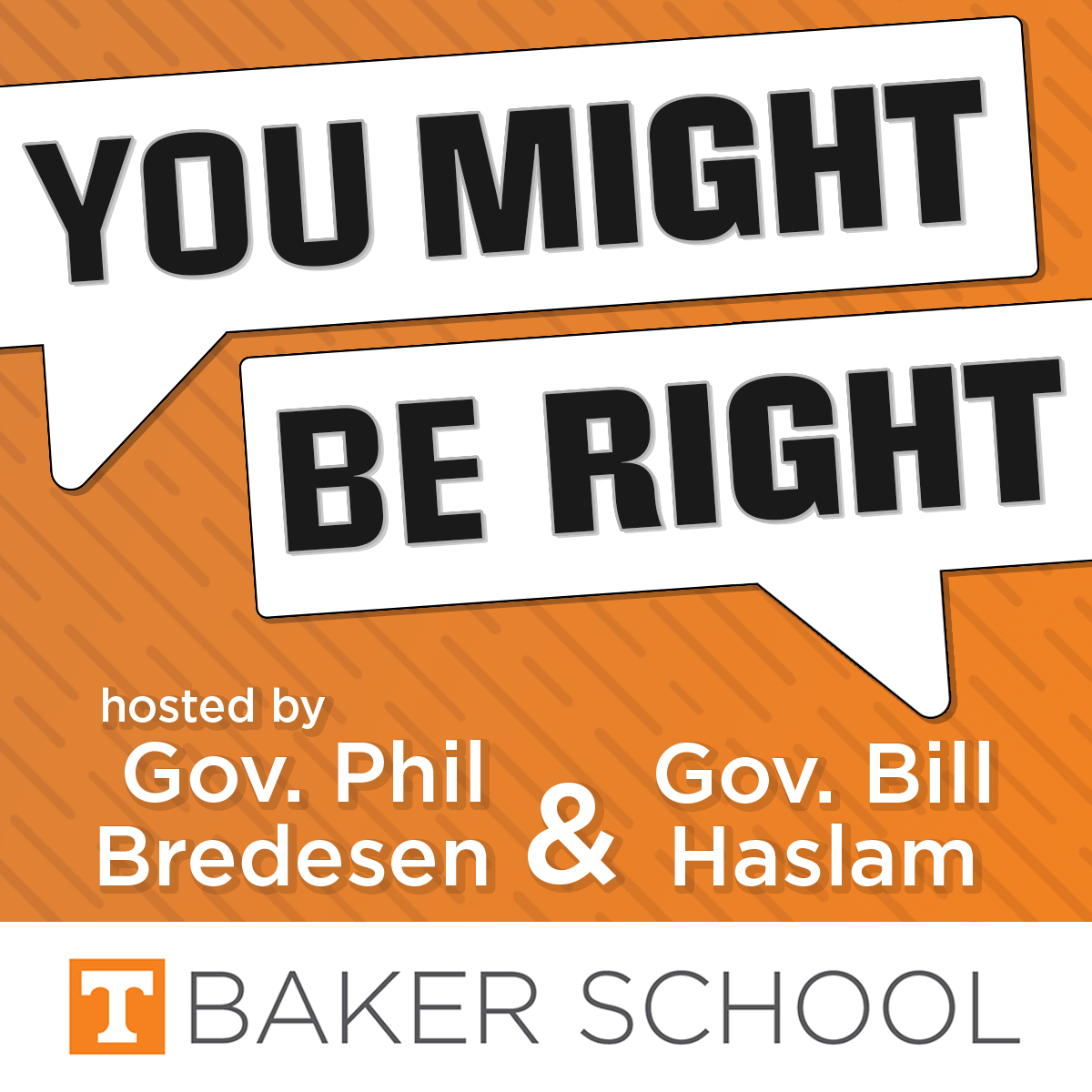Phil & Bill Answer Your Questions
Two years and more than 200,000 downloads later, You Might Be Right has inspired listeners across the country.
In recognition of this milestone, we invited some of our most avid listeners to participate in an episode by asking Governors Bredesen and Haslam questions about the podcast, about their time in office, or current hot topics. Listeners called in with a variety of questions, several of which we have highlighted here. To submit a question for consideration in a future episode, please email YouMightBeRight@utk.edu.
Subscribe and follow You Might be Right wherever you get your audio content – including Apple Podcasts and Spotify – to never miss an episode, or sign up for our email list to receive new episodes straight to your inbox each week here.
“There are certain issues that are just too important”
The first question the governors responded to was from a listener seeking advice about how to keep your cool when discussing an existential issue like climate change, as the prospect of talking about a controversial topic can keep someone from bringing it up altogether.
Governor Haslam acknowledged this is a very real concern in our current environment, and an important one to try and work through.
“I’m preaching to myself as I say this, but one of the things I try to do is to start with, ‘Tell me how you feel about X and why you feel that way,’ and give them a chance to validate why they feel that way and then start the discussion,” he said. “I do think there are certain issues that are just too important for us not to talk about that we have totally quit talking about.”
Governor Bredesen added that another important thing is “just to recognize that people’s worlds might be very different from your own in terms of what’s important to them and how they see things…trying to understand why they feel that way and what about their world is different, that empathy is really important.”
For more advice on how to navigate difficult conversations, listen to our episodes with acclaimed author and happiness expert Arthur Brooks and the governors of Utah and Colorado, who launched an initiative to encourage Americans to disagree better.
“The ability of the candidate to respond”
Another listener asked the governors what they look for when they vote for a political candidate – do they toe the party line, or do they vote based on their character? Governor Bredesen noted that for him, it depends on the election. “When you get further up the ladder for something like president, I think it’s a much different equation, and for me, it’s not about issues,” he said. “It’s more about a sense of how do you think this person will respond to the unexpected? When you think of any presidency in my lifetime, the things that presidency is known for – or washed up on the rocks on – are not things that were ever part of an election…So in my mind it’s about the ability of the candidate at those levels to respond to novel situations and think things through is what I’m really looking for more, than a specific ideology.”
Governor Haslam added that one of the main things he looks for is if a candidate has a history of solving problems. “That’s what we elect people to do, is to help us manage whatever the entity is, a city, a state, a country. But then to solve the issues that come up…nobody knows that that issue is going to be.”
“Even a pancake has two sides”
One listener wanted to know more about how the topics and guests are chosen for You Might Be Right. “The original premise was, let’s take a hard issue whether it be immigration or gun rights or whatever it is, and try to explain the other side,” Governor Haslam explained. “When you’re in office, you realize that most arguments have another side to them. As a friend of mine used to say, ‘even a pancake has two sides,’ and when you’re the one making that last decision, then it’s imperative that you at the very least understand the other side’s arguments, and that’s what we’re trying to do.
”Governor Bredesen added that as the show has evolved, seasons have taken on more specific themes. For example, Season Four focused on election-related issues including the Electoral College, the primary system, third-party candidates, and the role of traditional media.
“All about the teachers”
The governors answered several education-related questions, including one about the most important policies that lawmakers should focus on to improve the state’s K-12 education system, especially for students historically disadvantaged by geography or poverty.
Governor Bredesen said, “I come at education from the standpoint of it really is all about the teachers… So, from my mind, it’s just figuring out how you get the best people into teaching, that you give them the tools that they need to teach, that you find out ways to support them and manage that human capital.”
Governor Haslam emphasized the importance of raising expectations for all students. “We have to really, really mean that, and not say, well, that school has traditionally performed low, and we shouldn’t expect more. I just think that’s dead wrong,” he said.
To learn more about this topic, listen to our episode on addressing disparities in public education, recorded live at the National Civil Rights Museum in Memphis.
Subscribe and follow You Might be Right wherever you get your audio content – including Apple Podcasts and Spotify – to never miss an episode, or sign up for our email list to receive new episodes straight to your inbox each week here.

Join the conversation on Twitter by following @UTBakerSchool, @PhilBredesen, and @BillHaslam.


